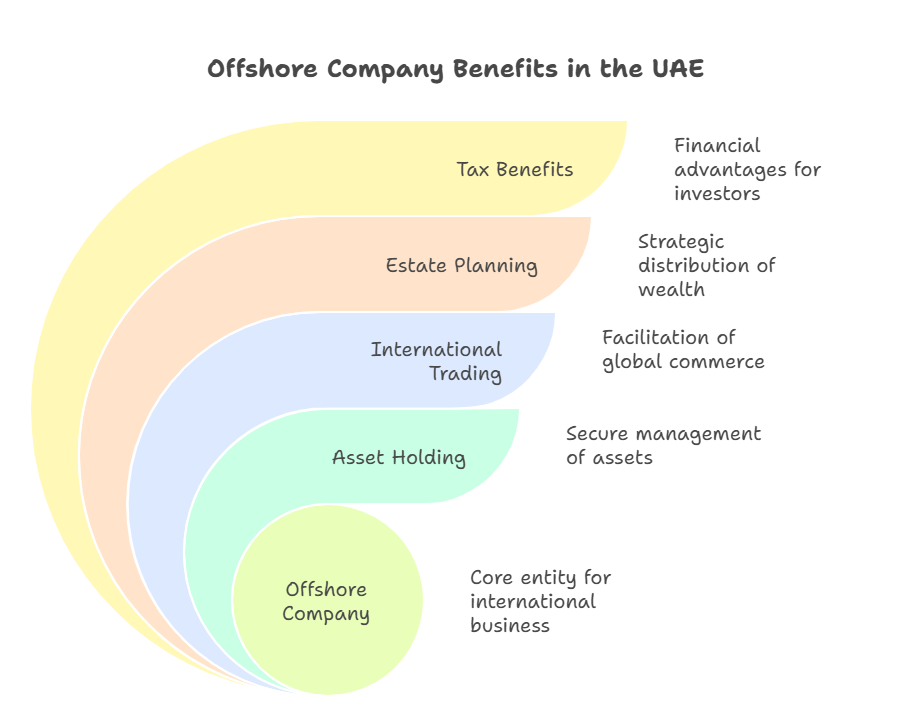
Introduction to Offshore Companies in the UAE
The UAE has become a global hub for offshore company incorporation. Investors from across the world choose it for its flexible laws, tax benefits, and international reputation.
An offshore company allows foreign investors to conduct business outside the UAE while enjoying legal protection and favorable tax structures. These companies are ideal for holding assets, international trading, and estate planning.
What is an offshore company?
An offshore company is a legal entity registered in the UAE but permitted to operate outside the country. It cannot conduct local UAE business directly but can own property, hold shares, and open bank accounts.
Why investors choose UAE for offshore incorporation
The UAE offers strong legal frameworks, political stability, zero corporate tax on offshore activities, and access to global financial markets. Combined with quick setup processes, it is one of the most attractive offshore jurisdictions worldwide.
Key Benefits of Offshore Company Formation in UAE
Tax advantages
Offshore companies in the UAE benefit from zero corporate tax, no income tax, and no capital gains tax on international business activities. This makes it a cost-effective structure for global investors.
Asset protection
Holding assets such as real estate or intellectual property under an offshore company provides legal protection and privacy. This is particularly valuable for high-net-worth individuals and international investors.
International trading opportunities
With an offshore entity, businesses can trade globally without double taxation agreements affecting profits. The UAE’s reputation boosts credibility in international markets.
Offshore vs Free Zone vs Mainland Companies
Major differences in structure and operations
- Offshore: For global business, no local UAE trade, strong privacy.
- Free Zone: Can operate within UAE free zones and internationally, 100% foreign ownership.
- Mainland: Allows local UAE trade, requires licensing from the Department of Economic Development (DED).
Which option suits your business needs?
- Offshore: Best for asset holding, international trade.
- Free Zone: Suitable for startups and exporters.
- Mainland: Required for businesses targeting UAE’s local market.
Step-by-Step Process to Set Up an Offshore Company in UAE
Choose the right jurisdiction (RAK, JAFZA, Ajman)
Popular offshore jurisdictions include Ras Al Khaimah (RAK), Jebel Ali Free Zone Authority (JAFZA), and Ajman. Each offers unique benefits depending on business needs.
Select a company name and business activity
The chosen name must follow UAE naming guidelines. Business activities should align with offshore regulations, typically focused on global trade, holding, or investment.
Prepare and submit documentation
Required documents include passport copies, proof of address, shareholder details, and application forms. Submission is done through registered agents.
Open a corporate bank account
Once registered, the company can apply for a UAE bank account. This step may require additional verification and is often the most time-consuming.
Legal Requirements for Offshore Companies in UAE
Shareholders and directors
At least one shareholder and one director are required. They can be the same person or corporate entities.
Registered office requirements
An offshore company must have a registered office address in the UAE, provided by its agent or service provider.
Compliance and reporting rules
While offshore companies are exempt from annual audits, they must maintain accurate records and comply with UAE anti-money laundering laws.
Costs of Offshore Company Setup in UAE
Government fees and licensing
Registration fees vary by jurisdiction but typically range between USD 1,500 – 3,000.
Service provider fees
Formation agents charge additional fees for handling documentation, registration, and advisory services.
Ongoing maintenance costs
Annual renewal fees apply, covering licenses and office registration. These are generally lower compared to free zone or mainland companies.
Common Challenges in Offshore Incorporation
Bank account opening difficulties
Banks apply strict compliance checks, especially for offshore entities. Approval can take weeks and may require in-person visits.
Documentation errors
Incorrect or missing documents delay the process. Using an experienced service provider helps avoid mistakes.
Misunderstanding tax residency rules
While offshore companies enjoy tax benefits, they don’t grant UAE tax residency. Confusing the two can cause compliance issues abroad.
Choosing the Right Offshore Company Formation Partner in UAE
Qualities to look for in a service provider
- Licensed and experienced in offshore company setups.
- Transparent fee structure.
- Strong relationships with banks.
- Proven track record with international clients.
Questions to ask before signing agreements
- Which jurisdiction is best for my goals?
- What documents do I need to prepare?
- How long will the setup process take?
- Do you assist with bank account opening?
Conclusion
Setting up an offshore company in the UAE offers tax efficiency, asset protection, and access to global markets.
By choosing the right jurisdiction and working with a reliable service provider, investors can benefit from a smooth setup process and long-term business advantages.


